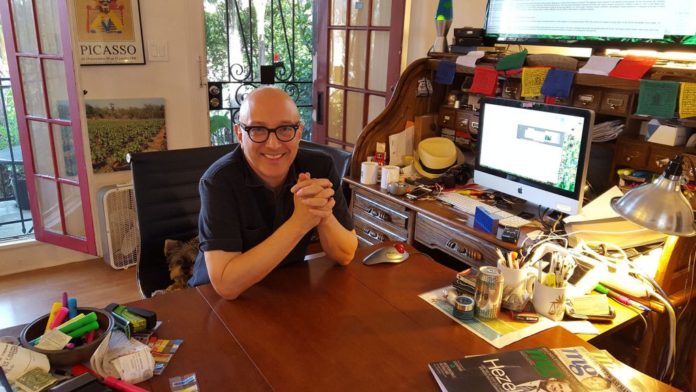Attorney Stewart Richlin rails against the unfairness and constitutional deficiencies in California’s trio of new cannabis laws.
I have an appointment to interview attorney Stewart Richlin for one hour at his home office in the MacArthur Park section of Los Angeles. He calls my cell at exactly 9:45 a.m., our appointed time. I’m already late. Luckily, I’ve found a parking spot across the street and am seated at his desk within a minute. Richlin, I learn straightaway, is punctilious not just about time management, but also semantic precision. Right off the bat, I earn a derisive look from him when I make a foolish reference to dispensary owners.
“First of all,” he corrects, “there is no such a thing as a dispensary owner; there are dispensary managers. The reason is, under the current set of laws, a dispensary is a non-profit, and people don’t own non-profits.”
From that instant, I am attentive as a cat on a hot tin roof. Richlin, who looks to be in his 40s, turns out to possess not only a formidable understanding of cannabis law in California, but also a contagious regard for the “mom-and-pop” collectives caught up in profoundly prejudicial laws. Over the years, he has represented more than 500 collectives, consulted with them on formation rights, and acted as a litigator. “I’ve been a lawyer for 30 years and have litigated against about ten or twelve different cities and counties,” he says. “The current lawsuit I am in involves Prop D, and now—assuming the governor shall sign 266, 246, and 643, and assuming that I have some clients that want to hire me to do so—I and my legal team will be very happy to challenge the new rules, because they do not appear fair to me.”
Since the interview, the governor has in fact signed the bills into law, something Richlin anticipated against all hope. The battle he has been fighting for years at the local level now has been codified in state law.
“Local law is the province of cities and the counties that under the Riverside decision have the power to even ban patients from growing their own medicine, and that’s a shitty law and that’s got to change,” he explains. “Unfortunately, 266, 243, and 643 cement in those idiosyncratic differences between each of the local cities, counties, and local towns and jurisdictions, making a patchwork of impossible-to-navigate rules and creating a terrible disservice to patients, especially if there are no stores in their neighborhood and no ability for them to grow. It precludes delivery unless there is a store in the neighborhood, and precludes growing unless the city says you can. The new rules also contravene the Kelly case, which says the legislature may not delegate or limit Prop 215, which doesn’t have canopy limits or caregiver number limits, so it is improper to insert those limits.”
Richlin says it is wrong to permit managers of non-profits to turn them into for-profits. “With a non-profit, the actual equity owners are the patients. What gives this manager the right to take a for-profit license in his name to the exclusion of the other members of the collective? And then, finally, what about all the jury instructions, cases, and city ordinances that refer to co-ops and collectives that will now have to be thrown out in favor of the new licensing scheme? Finally, the licensing scheme will encourage monopolies and existing companies that have power, and not mom-and-pops. It is an exclusive rule, not an inclusive rule, and it is going to create crimes and put more people in jail. Anyone who has thought through the new rules finds them disgusting.”
Under 266, he continues, “only licensed cultivators will be able to grow, and only if your city says you can grow. So now everyone is going to go hat-in-hand groveling to their city council, trying to kiss some ass to get permission to use some marijuana instead of using it the way it should be: in farmer’s markets, swap meets, economic activity, salves, ointments, inventions. 266 says that the edibles have to be generic, but that’s against the American way. They just don’t seem to understand how things work. They want to send all these mom-and-pop growers who currently make a living supplying marijuana to the collectives out into the streets, or make them fill out a license application and specify their exact procedures and steps—like writing out a confession. How can the state begin to cause you to do a license process when federal law says that’s a felony? Isn’t there such a thing as a Fifth Amendment privilege against self-incrimination? What we need to do is fully deregulate and decriminalize and ultimately de-schedule marijuana on the federal level, because it is a wholesome agricultural product that is no different than carrots and mint and maybe light beer, because of the fact that it makes people high. There is no evidence of driving problems or any problems. It’s anti-cancer and drives suicide and murder rates down. Crimes go down wherever we have more marijuana.”
Richlin also finds constitutional deficiencies in the new laws, claiming they create “tremendous unequal standing before the law.” He elaborates, “Under 266, someone who was a cowboy in 2006 now is able to continue to grow and sell medical marijuana until 2026. Because they got a license back before June of 2015, they are unfettered. They don’t need to test their marijuana, they don’t need to use licensed transporters or follow any of the new rules, and they can continue to do what they’ve been doing until 2026. Whereas for the new guy, a year after licenses are offered his defense to a felony is going to be gone. Under 266, every collective will expire one year from the first license issue date, so if the government issues licenses in 2017, in 2018 every co-op and collective will expire along with their defense, and that means every one of those grows is a felony. But they’re not telling you in the mainstream that they are about to felonize the majority of grows in the state of California. As it is now, if someone doesn’t have a license from their city, they are subject to a misdemeanor, a slap on the wrist, because the cities only have the power to enforce licensing and zoning. Under 266, however, the cities will have the power to enforce a felony drug crime against a small grower. It’s a shitty rule. One guy’s a hero and can stay open for eleven more years; the next guy is a felon. It’s unfair.”
When asked what will happen to the mom-and-pop collectives, fighting words discharge from Richlin like pellets from a scattergun. “People will be driven to the gray or black market, the opposite of the effect we want. When that happens, there will be a glut of marijuana on the black market that will become much cheaper than legitimate medical marijuana because of the testing and all of the other bullshit required by these laws. It is going to create more crime, favor criminal cartels, and put more people in jail, creating more work for lawyers who want that type of work. Any lawyer who is a decent civil rights lawyer would rather fight other battles and move on from this marijuana thing, even though it’s the bread and butter for many people in the industry. We want to give it up. I’ve spoken with Bruce Margolin about this and he is of the same mind, and so are the other lawyers that I just met with the other night talking about legalization. We have other talents, and we have plenty to do.”
He adds, exposing some light at the end of the tunnel, “The good marijuana lawyers are going to help show the way to end this marijuana patchwork, but what we really need to do is get a proposition that will not only legalize, but it needs to also handle 266.”
On the subject of ballot initiatives, Richlin is equally opinionated and has his favorites, ones that inspire in him a “philosophical joy.” Topping the list is CCHI 2016, AKA the “Jack Herer Initiative,” which he appreciates for its “simplicity and directness.” Other initiatives do not inspire such joy, among them ReformCA’s, which he says will also “create new laws.” More on that in a subsequent issue.
As the hour comes to an end, I ask Richlin if he has any advice for collectives concerned about how to navigate the new reality. “Yes, of course. I counsel people every day about the future.” Holding up a pair of flash drives, he continues, “This is my 266 packet, and this is the pre-266 packet that was updated a month before 266 came in. The main thing that people can do who are in business or are desirous of taking care of medical marijuana patients is to evaluate what their options are in their city. If they are going to be part of 266, they should come in for a consultation so that they can actually be a source of knowledge and help to their city councilmen. My clients, by going over material with me, at least can go in a state of knowledge to the staff or secretary of the city council member they are going to be dealing with, and then they can make the case to them that if their city does not have resources in place, then it will not be along the curve of the other cities who are going to have medical marijuana opportunities in place. The city could then fall behind, and cities that fall behind could get left behind. In doing that, those cities that are informed by a knowledgeable advocate could say, ‘You know what, maybe we should start a lottery and get some licenses in place so that we can be a part of the green rush, too.’”











